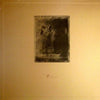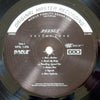











The Pixies – Surfer Rosa (Ultra Analog, Half-speed Mastering)
ORDER LIMITED TO ONE ITEM PER CUSTOMER
Vocals, Guitar – Black Francis
Bass Guitar – Mrs. John Murphy (Kim Deal)
Drums – David Lovering
Guitar – Joey Santiago
Written by Black Francis, Mrs. John Murphy (A5)
1 LP, gatefold jacket
Limited numbered edition
Original analog Master tape : YES
Half-speed Mastered
Gain 2™ Ultra Analog
Heavy Press : 180g
Record color : black
Speed : 33RPM
Size : 12”
Stereo
Studio
Record Press : RTI
Label : MOFI
Original Label : 4AD
Recorded November 1987 at Downtown Recorders, Boston and December 1987 at Q Division Studios, Somerville, MA
Mixed at Q Division Studios, Somerville, MA
Mixed at Q Division Studios, Somerville, MA
Engineered and produced by Steve Albini
Mastered at Mobile Fidelity Sound Lab
Originally released in March 1988
Reissued in 2009
Tracks:
Side A:
- Bone Machine
- Break My Body
- Something Against You
- Broken Face
- Gigantic
- River Euphrates
Side B:
- Where Is My Mind?
- Cactus
- Tony's Theme
- Oh My Golly!
- Vamos
- I'm Amazed
- Brick Is Red
Awards
Rolling Stone 500 Greatest Albums of All Time - Rated 390/500!
#7 on Pitchfork’s Top 100 Favorite Records of the 1980s
Reviews:
“One of the most compulsively listenable college rock albums of the '80s, the Pixies' 1988 full-length debut Surfer Rosa fulfilled the promise of Come on Pilgrim and, thanks to Steve Albini's production, added a muscular edge that made their harshest moments seem even more menacing and perverse. On songs like "Something Against You," Black Francis' cryptic shrieks and non sequiturs are backed by David Lovering and Kim Deal's punchy rhythms, which are so visceral that they'd overwhelm any guitarist except Joey Santiago, who takes the spotlight on the epic "Vamos." Albini's high-contrast dynamics suit Surfer Rosa well, especially on the explosive opener "Bone Machine" and the kinky, T. Rex-inspired "Cactus." But, like the black-and-white photo of a flamenco dancer on its cover, Surfer Rosa is the Pixies' most polarized work. For each blazing piece of punk, there are softer, poppier moments such as "Where Is My Mind?," Francis' strangely poignant song inspired by scuba diving in the Caribbean, and the Kim Deal-penned "Gigantic," which almost outshines the rest of the album. But even Surfer Rosa's less iconic songs reflect how important the album was in the group's development. The "song about a superhero named Tony" ("Tony's Theme") was the most lighthearted song the Pixies had recorded, pointing the way to their more overtly playful, whimsical work on Doolittle. Francis' warped sense of humor is evident in lyrics like "Bone Machine"'s "He bought me a soda and tried to molest me in the parking lot/Yep yep yep!" In a year that included landmark albums from contemporaries like Throwing Muses, Sonic Youth, and My Bloody Valentine, the Pixies managed to turn in one of 1988's most striking, distinctive records. Surfer Rosa may not be the group's most accessible work, but it is one of their most compelling.” AllMusic Review by Heather Phares
“The heaviness and hugeness of the room-reverberating drumbeat that begins the album-opening ‘Bone Machine’ epitomizes the record’s forward impact, visceral punch, grinding crunch, and dynamic headroom. Rather than cluttering the mix with an avalanche of effects, Albini left space without sacrificing live detail or volatile oomph, shown to great effect on ‘Broken Face’, ‘Gigantic (there’s a piano’ who knew?), and haunting ‘Where Is My Mind?’ which opens unto a sonic canyon that swallows the listener whole.” Bob Gendron, The Absolute Sound, September 2007
"Smack in between hardcore punk and alternative, it was impossible to deconstruct the Pixies' ferocious howl. Their secret weapon was leaping from sweet to screamin' (which Kurt Cobain admitted to boosting): On "Gigantic," Kim Deal sings like Peppermint Patty as the band drives a spike into Eighties rock." Rolling Stone
Ultra Analog™ : The GAIN 2 Ultra Analog™ Series stems from the use of the Gain 2 system, mastered at half speed from the original master tapes where possible, capturing and uncovering as before undiscovered sonic information.
Half-speed mastering. In half-speed mastering, the whole process is slowed down to half of the original speed. A typical 33 1/3 rpm record is cut at 16 2/3 rpm. The source material is also slowed down (reducing the pitch in the process) meaning the final record will still sound normal when played back. Slowing the whole process down allows more time, which means the end result sounds better and is more efficient — allowing engineering to minimize the effects of inherent limitations within the vinyl format. The result is a more accurate and more open high-frequency response in the half speed vinyl when compared with a normal speed recording.
Ratings :
AllMusic : 5 / 5 , Discogs : 4.68 / 5

